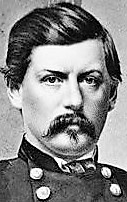
Gen. McClellan–out for the second time.
Previously in the novel: War Secretary Edwin Stanton held President and Mrs. Lincoln captive under guard in basement of the White House. He guided his substitute Lincoln through his first Cabinet meeting. Then he told Lincoln’s bodyguard Ward Hill Lamon into believing Lincoln and his wife were in hiding because of death threats. Lincoln’s secretaries realize something is wrong but are afraid to say anything. Janitor Gabby Zook, caught in the basement room with the Lincolns, begins to think he is president. Stanton rips Gabby’s quilt from his sister Cordie and then proceeds with a strategy meeting with the President.
“If I know my politics,”—Stanton sat, his chin barely clearing the top of the table, pulled out a notepad, and flipped it open—“the general victory of the Republican Party in the congressional elections give us—rather, you—the mandate to remove General McClellan.”
“Which finally fulfills your wish that led to our detention in the basement,” Lincoln said, staring at Stanton, who continued to read his notes. “Does this mean I may return to the world of the living, so to speak?”
“And give you the opportunity to reinstate him yet a third time?” Stanton kept his eyes down. “I think not.”
“I assure you, that’s a mistake I won’t make again.”
“And I’m going to make sure that you don’t, by keeping you where you are.” Stanton looked at Lincoln. “I’d hoped to have the war over by the end of the year, but getting rid of McClellan took longer than I thought.”
Gabby did not understand Stanton’s apparent disdain for Lincoln. Over the last two months, he had observed the man and found him to be quite capable. In fact, if Gabby were not president, Lincoln would make a good one. If he were president, Gabby corrected himself, because he was still not clear on that point.
Lincoln sighed. “So who is to replace General McClellan?”
“General Ambrose Burnside.”
“He’s turned it down before. Said he was not fit for the job.” He chuckled. “Of course, that makes him smarter than McClellan right there.”
“His excursion into North Carolina last year was commendable.”
“But his actions at Antietam were questionable.”
“We should be careful in our judgment of Antietam,” Stanton said. “After all, our facts of the situation are taken from the report filed by General McClellan.”
“Who feared Burnside as a pretender to his post,” Lincoln continued, filling in the supposition. “It’s not that I don’t like the fellow personally. He’s the first person I’d head toward to talk to at a party; unfortunately, we’re not making out a party list, but an appointment to lead the Army of the Potomac.”
“Whom would you select, then?” Stanton sat back and crossed his arms.
“Are you asking my opinion?” Lincoln smiled. “I didn’t think my opinion counted for much.”
“I’m wasting my time here.” Sitting up, Stanton took off his glasses.
“Perhaps you’re right.” Lincoln stood and stretched.
“I merely came down here to keep you informed.” Stanton stood, putting away his notepad. “Out of professional courtesy.”
Was it very courteous to lock the man and his wife up in the basement? Gabby wanted to ask, but did not want to incur another round of Stanton’s wrath. If he were indeed president, he thought distractedly, he would want to follow the diplomatic approach with the obstinate little man with the pharaoh beard.
“Where’s the Army of the Potomac encamped at this moment?” Lincoln asked.
“Warrenton, Virginia.”
“And its current troop strength?”
“I believe one hundred twenty thousand.”
“I appreciate your professional courtesy.” Lincoln smiled.
“I must be on my way.” Stanton turned to leave.
“When you speak to General Burnside,” Lincoln added, “you might suggest that he abandon McClellan’s movement to the southwest down the peninsula, but instead take an aggressive advance on Fredericksburg.”
“Fredericksburg?” Stanton pulled out his notepad.
“That’d position our troops on the road to Richmond and also protect our supply line to Washington.”
“I’ll pass on your ideas.” Stanton wrote quickly. “As a professional courtesy.”
“I’m grateful.” Lincoln paused, then raised a bony finger to his forehead. “And he should attempt to move by the end of November.”
As Stanton put away his pad again, Mrs. Lincoln stepped from behind the curtain.
“Mr. Stanton?”
“Now, Molly, Mr. Stanton is a busy man and must be on his way,” Lincoln said.
Sighing, Stanton asked in his low musical voice, “What is it, Mrs. Lincoln?” He took out his pocket watch to check the time.
“I’m so sorry for slapping you,” she said. “It’s just that the quilt means so much to Mr. Gabby. Even so, ladies must express themselves in a proper manner.”
“Apology accepted.”